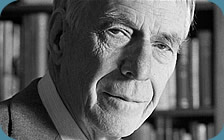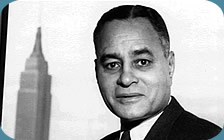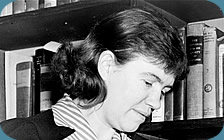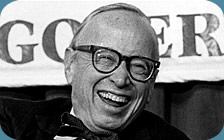
Diplomat Henry Kissinger
1968 Speaker
Nobel Peace prize winner Henry Kissinger – at that time a Harvard professor of government and international affairs – spent two days on campus, as did all the speakers in a series organized in 1967-68 by Robert Feldman, professor of history emeritus. “Each of the speakers attracted between 2,500 and 6,500 people, which was a lot of people for North Orange County in those days,” recalled Feldman. “Before his lecture, Kissinger told me that he believed we were overextended in Vietnam and that our allies in the Far East felt the same way. When he got up on the platform to speak, he gave the party line, turning around 180 degrees from what he told me individually. He said publicly that we had to stay in Vietnam to stop the spread of communism.”
|

Economist John Kenneth Galbraith
1968 Speaker
John Kenneth Galbraith was an influential Keynesian economist, a leading proponent of 20th-century American liberalism and progressivism. His books on economic topics were bestsellers in the late 1950s and 1960s. At the time Galbraith spoke at Fullerton, Lyndon Johnson had been campaigning in New Hampshire with Eugene McCarthy. After a close election there, Johnson had decided not to run for president. He made the announcement the same day as the Fullerton lecture. “Galbraith was a major supporter of McCarthy,” remembered Feldman. “A student asked him if he’d heard the news about Johnson. You could have floored Galbraith. He was stunned, along with a lot of other people. He sat right down, and asked the student to tell him everything he knew about the news.”
|

Diplomat and Civil Rights Leader
Ralph Bunche
1968 Speaker
Ralph Bunche was an eminent scholar and Nobel Prize-winning professor who became a brilliant internationalist, civil rights leader and undersecretary general to the United Nations. After Bunche’s presentation, remembers Feldman, press from all over the world congregated at Orange County State College to interview Bunche, who had been selected by the United Nations Secretary General to fly to Washington to meet with President Johnson. From there he went on to negotiate with North Korea for the release of the seamen from the Pueblo, which had been seized off the North Korean coast. “It’s probably the biggest press conference we’ve ever had,” Feldman said.
|

Anthropologist Margaret Mead
1969 Commencement Speaker
Margaret Mead was one the first female celebrities invited to speak on campus. “Well into the 1980s, Margaret Mead was the equivalent of a national spokesperson for anthropology,” said Sue Parman, professor of anthropology.
“The key to her success was that she applied anthropology to American needs and topics of interest, whether to sum up national characteristics of ‘the enemy’ during World War II, explain why stormy American adolescence was not a biological universal, or explain that while ‘sex’ might be biological, ‘gender’ was not.
“Drawing upon the diversity of cultures that make up the anthropologist’s special expertise, Mead made the familiar strange and the strange familiar,” Parman added. “In New Guinea, men debated fashion while women went unadorned to work in the horticultural gardens, in Samoa adolescents surfed easily into adulthood, and in North America, babies were left to sleep alone in dark rooms.”
Feldman recalled that when the controversial anthropologist visited campus, she was recovering from a recent hip fracture suffered during a visit to Borneo. “She came carrying this huge stick with a big gnarl at the end that had been given to her by a tribal chief,” recalled Feldman. “Crowds wanted to get close to her. I remember she used the stick to keep people away.” |

Historian Arthur M. Schlesinger Jr.
1969 Convocation Speaker
Pulitzer Prize-winning author, historian and social critic Arthur M. Schlesinger Jr. spoke at convocation. Schlesinger served as special assistant to President John F. Kennedy and wrote a detailed account of the Kennedy administration titled “A Thousand Days.” His works explore American political leaders including Franklin D. Roosevelt, Kennedy, and Robert Kennedy. He coined the term “imperial presidency” during the Nixon administration. Schlesinger “was quite affable for a person as famous as he was,” said Larry de Graff, professor of history emeritus, who recalled driving Schlesinger back to his Beverly Hills hotel room following his speech. “Everything he said was put into the context of his views, which were liberal. And he was lively for his years.” |
|
